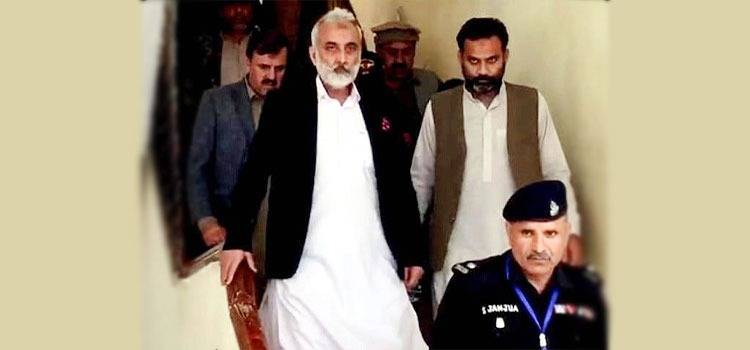
A judicial magistrate in Quetta on Friday granted bail to Balochistan Communications and Works Minister Sardar Abdul Rehman Khetran in the Barkhan triple murder case, citing 'lack of evidence'.
Approving the bail, Sessions Judge Malik Sujhao Din ordered the accused to submit surety bonds worth Rs500,000.
After the hearing, Khetran's counsel Manzoor Rehmani told media persons that no charges were proved against his client.
The victims were held captives since 2019 in one of such prisons, allegedly run by Khetran, a leader of the government ally Balochistan Awami Party.
The Levies force had conducted raids in three different districts to recover the victims. East Balochistan and South Punjab were the locations of the operations.
Levies officials said at the time that the kidnappers tried to shift two abducted kids to Punjab, but their attempt was thwarted by the force.
Khetran was subsequently arrested for his alleged involvement in the killing and the hiding of the bodies.
Last month alone, Balochistan has witnessed incredibly tough days where the already sickening enforced disappearances now include women and children as victims too, while private jails, run by ministers and local elites, have begun to destroy innocent lives.
In Balochistan, it seems that justice has always remained a mystery for the masses because the perpetrators are supported by the ‘powers’ that no one can challenge. Resultantly, a sense of deprivation is taking deep roots among the youth and women, which is fueling the ongoing insurgency in the ‘never-eyed’ province.
The tragedy, above all and everything, is evidence that the province is used to the formations of judicial commissions that ultimately lead to nothing. From the commission on enforced disappearances to the one on Ziarat’s fake encounters, every authority formed in Balochistan sought to serve the interests of parties other than civilians. In this situation, the Baloch are forced to think if the state will ever view them as their own and worthy of rights.
Approving the bail, Sessions Judge Malik Sujhao Din ordered the accused to submit surety bonds worth Rs500,000.
After the hearing, Khetran's counsel Manzoor Rehmani told media persons that no charges were proved against his client.
The victims were held captives since 2019 in one of such prisons, allegedly run by Khetran, a leader of the government ally Balochistan Awami Party.
The Levies force had conducted raids in three different districts to recover the victims. East Balochistan and South Punjab were the locations of the operations.
The tragedy, above all, is evidence that the province is used to the formations of judicial commissions that ultimately lead to nothing. From the commission on enforced disappearances to the one on Ziarat’s fake encounters, every authority formed in Balochistan sought to serve the interests of parties other than civilians. In this situation, the Baloch are forced to think if the state will ever view them as their own and worthy of rights.
Levies officials said at the time that the kidnappers tried to shift two abducted kids to Punjab, but their attempt was thwarted by the force.
Khetran was subsequently arrested for his alleged involvement in the killing and the hiding of the bodies.
Last month alone, Balochistan has witnessed incredibly tough days where the already sickening enforced disappearances now include women and children as victims too, while private jails, run by ministers and local elites, have begun to destroy innocent lives.
In Balochistan, it seems that justice has always remained a mystery for the masses because the perpetrators are supported by the ‘powers’ that no one can challenge. Resultantly, a sense of deprivation is taking deep roots among the youth and women, which is fueling the ongoing insurgency in the ‘never-eyed’ province.
The tragedy, above all and everything, is evidence that the province is used to the formations of judicial commissions that ultimately lead to nothing. From the commission on enforced disappearances to the one on Ziarat’s fake encounters, every authority formed in Balochistan sought to serve the interests of parties other than civilians. In this situation, the Baloch are forced to think if the state will ever view them as their own and worthy of rights.

